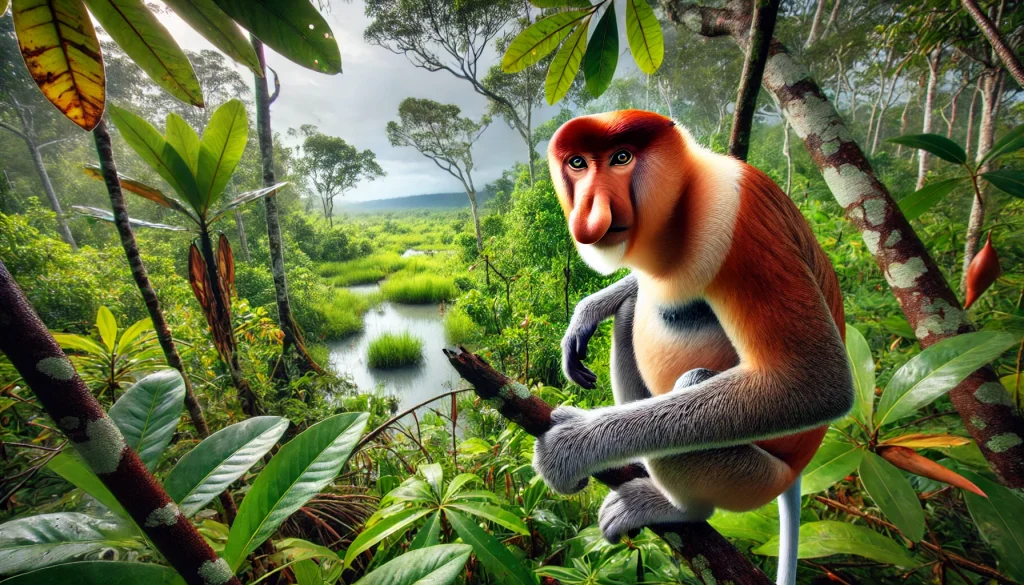En las profundidades verdes de la isla de Borneo, existe un primate que parece sacado de una caricatura, pero que en realidad es una joya de la evolución: el mono narigudo. Con una nariz que no pasa desapercibida y un estilo de vida lleno de curiosidades, esta especie representa uno de los rostros más singulares de la biodiversidad del sudeste asiático.
👃 Una nariz única con propósitos funcionales
En los machos, la nariz puede alcanzar hasta 7 pulgadas de largo. Lejos de ser un simple adorno, esta prominente protuberancia funciona como una caja de resonancia natural. Permite amplificar los sonidos de sus vocalizaciones, lo que resulta esencial para la comunicación dentro de la densa selva.
Además, se cree que la nariz también juega un papel importante en el cortejo: cuanto más grande, más atractiva resulta para las hembras. Sí, en el mundo del mono narigudo, ¡el tamaño sí importa!
🌿 El mono narigudo: maestro del nado y la movilidad arbórea
A diferencia de muchos otros primates, el mono narigudo es un nadador excepcional. Tiene membranas entre los dedos que le ayudan a desplazarse por el agua con sorprendente agilidad. Esto le permite cruzar ríos, manglares e incluso escapar de depredadores.
Pero no todo ocurre en el agua. También es ágil en las copas de los árboles, saltando de rama en rama con la precisión de un acróbata de la naturaleza. Esta doble habilidad hace que sea uno de los primates más versátiles del mundo.
🍃 Una dieta adaptada a la diversidad del ecosistema de Borneo
La alimentación del mono narigudo es tan interesante como su nariz. Come hojas tiernas, frutos, flores, semillas y brotes. Su sistema digestivo está especialmente diseñado para fermentar vegetación fibrosa, permitiéndole extraer nutrientes de alimentos que muchos otros animales no podrían digerir.
Esta dieta variada le permite sobrevivir a lo largo de las estaciones, adaptándose a lo que ofrece la naturaleza en cada momento.
🌊 Adaptabilidad y vulnerabilidad en un entorno en cambio
Pese a todas sus habilidades, el mono narigudo depende profundamente de su hábitat natural. La pérdida de bosques y manglares representa una amenaza directa para su supervivencia. Al reducirse su entorno, disminuyen también sus fuentes de alimento, refugio y movilidad.
Esta especie, aunque altamente adaptable, no puede enfrentar sola los efectos del cambio ambiental acelerado.
🚨 Amenazas y la urgencia de la conservación
El mono narigudo está en peligro debido a la deforestación, la agricultura extensiva y la caza ilegal. Además, algunos ejemplares son capturados para el comercio de mascotas, lo cual es una amenaza adicional para su población ya reducida.
Conservar a este peculiar primate no es solo una misión ecológica, sino también un esfuerzo por preservar uno de los símbolos vivos de la riqueza natural de Borneo.
📺 ¿Quieres ver más animales asombrosos?
Pancho te los presenta en nuestro canal de YouTube:
🧡 Haz clic aquí y suscríbete
Déjate sorprender por la naturaleza como nunca antes.
🧠 Datos curiosos sobre el mono narigudo
- 👃 Su nariz puede crecer durante toda su vida.
- 🏊♂️ Es uno de los pocos primates que puede nadar largas distancias.
- 🍽️ Puede pasar horas comiendo hojas para obtener suficiente energía.
- 🗣️ Sus vocalizaciones varían según la situación: alerta, comunicación, apareamiento…
- 🌳 Vive en grupos sociales jerárquicos, liderados por machos dominantes.








